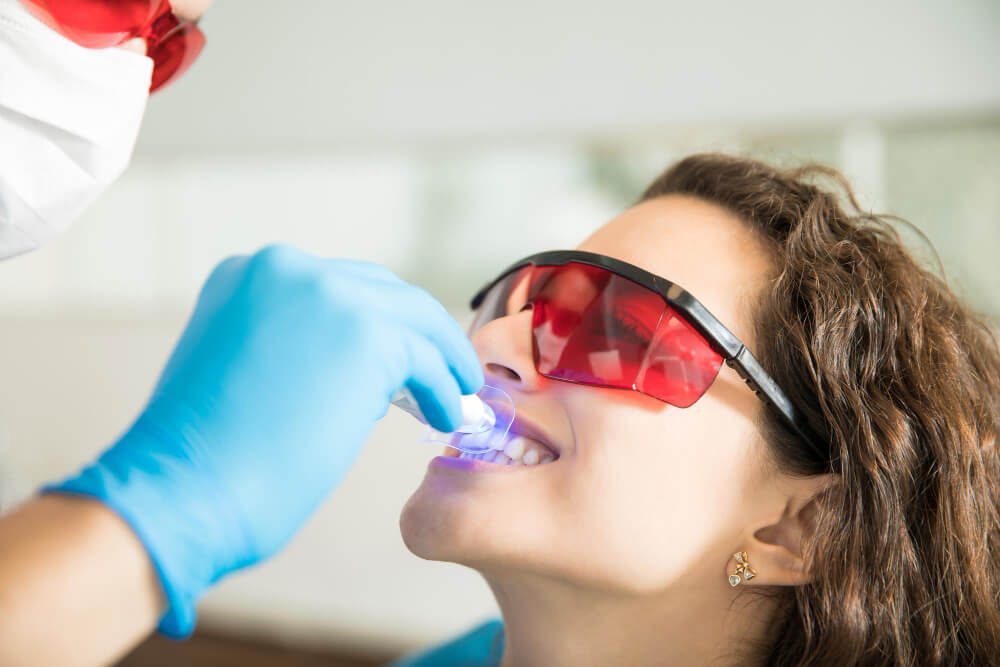Does Teeth Whitening Damage Teeth? Safety and Risks Explained

Teeth whitening has become the go-to treatment for anyone looking for that picture-perfect smile. It promises to brighten your grin and lift years of stains from in-office procedures to over-the-counter products.
But with the rise of this popular treatment, a common question keeps popping up — does teeth whitening damage teeth?
Let’s examine teeth whitening, its safety, and what to watch out for to keep your smile bright and healthy.
What Happens During Teeth Whitening?
Bleaching agents like hydrogen or carbamide peroxide are at the heart of most teeth-whitening treatments. These chemicals penetrate the enamel — the outer layer of your teeth — and break down stains in the dentin underneath.
This process releases oxygen molecules that interact with the discoloured compounds in your teeth, essentially fading them out. It’s not about painting your teeth white — it’s about restoring their natural brightness by removing surface and deeper stains.
Is It Safe for Your Teeth?
The good news is that teeth whitening is generally safe when done properly — especially under the supervision of a dentist. But like any treatment, it’s not entirely risk-free.
Possible Side Effects:
- Tooth Sensitivity: Some people become more sensitive to heat or cold after whitening. This is usually temporary and tends to subside within a few days.
- Gum Irritation: If whitening gels come into contact with your gums, they can cause temporary irritation or a burning sensation.
- Overuse Risks: Excessive or frequent whitening—especially with at-home products—can wear down enamel over time, making teeth more vulnerable to decay and sensitivity.
Whitening isn’t harmful when done in moderation and under guidance. Problems usually arise from improper use or overuse.
Professional vs At-Home Whitening: What’s Safer?
Whether you go to a dentist or try whitening at home, the safety and results largely depend on how the treatment is applied — and how often.
Professional Teeth Whitening
Professional teeth whitening procedures, often performed in a dentist’s office, are known for quick and dramatic results. These treatments use high concentrations of a bleaching agent, typically between 25% and 40%. Given the potency, a dentist will use protective measures, like gum barriers, to prevent tissue irritation.
The treatment is usually enhanced with specialised lights or lasers, accelerating bleaching and maximising results. A trained professional overseeing the procedure can adjust to individual needs, reducing risks and ensuring optimal outcomes.
At-Home Whitening
The allure of at-home whitening kits lies in their convenience and affordability. Available in various forms, from strips to gels to LED kits, these tooth whitening products typically contain lower concentrations of bleaching agents, ranging from 3% to 20%.
This makes them safer for unsupervised use but may require longer or more frequent applications to achieve desired results. While many kits come with well-detailed instructions, there’s a higher error margin than professional treatments. Overuse or incorrect application can lead to gum irritation or uneven whitening.

Teeth Whitening Myths — Busted
With so much buzz around teeth whitening, it’s no surprise that myths abound. Here’s the truth behind some common misconceptions:
❌ “Teeth whitening ruins your enamel.”
✅ Not true — whitening products don’t damage your enamel when used correctly. Temporary sensitivity is common but not permanent damage.
❌ “Once you whiten your teeth, they’ll stay that way forever.”
✅ Whitening isn’t permanent. Diet, lifestyle habits, and age will eventually cause staining again. Touch-ups and good oral hygiene help maintain results.
❌ “Natural remedies are better and safer.”
✅ Not always. DIY treatments like lemon juice or baking soda can be too abrasive or acidic, potentially harming your enamel more than helping.
❌ “Whitening toothpaste works just like professional treatments.”
✅ Although whitening toothpaste doesn’t bleach teeth like professional or peroxide-based techniques do, it can help eliminate surface stains.
How to Protect Your Teeth While Whitening
Want to enjoy a brighter smile without compromising your dental health?
Here are some practical tips:
- Consult your Northbridge dentist first, especially if you have sensitive teeth or existing dental work
- Don’t overdo it — follow the recommended frequency and duration
- Use desensitising products if needed
- Avoid stain-causing food and drinks (like coffee, red wine, and tobacco)
- Keep up your regular brushing, flossing, and dental check-ups
With the right approach, teeth whitening can be a safe way to enhance your smile without causing harm.
Is Teeth Whitening Worth It?
When done responsibly, teeth whitening doesn’t damage teeth. It’s a cosmetic enhancement that has helped countless people feel more confident. The key is making informed choices—understanding the products, the process, and how it fits your dental needs.
If you are unsure where to begin or want to know the safest solution for your teeth, professional advice can make all the difference.
Teeth Whitening in Northbridge
Ready to explore safe, effective teeth whitening? Contact your Northbridge dentist at (02) 8318 5966 for professional insights and personalised recommendations and to embark on your journey towards a radiant and healthy smile.
Your ideal smile might be a phone call away.
Visit us at Shop 20A Northbridge Plaza, 79-113 Sailors Bay Road in Northbridge.
